Idunn is a significant deity in Norse mythology. She is known as the goddess of youth, fertility, and the guardian of the golden apples of immortality.
The myth of Idunn and her apples emphasizes the importance of eternal youth and the fear of aging in Norse mythology. Her role as the guardian of the apples symbolizes the cyclical nature of life and the eternal rejuvenation that the gods enjoy through her magic.
Table of Contents
Who Was Idunn?
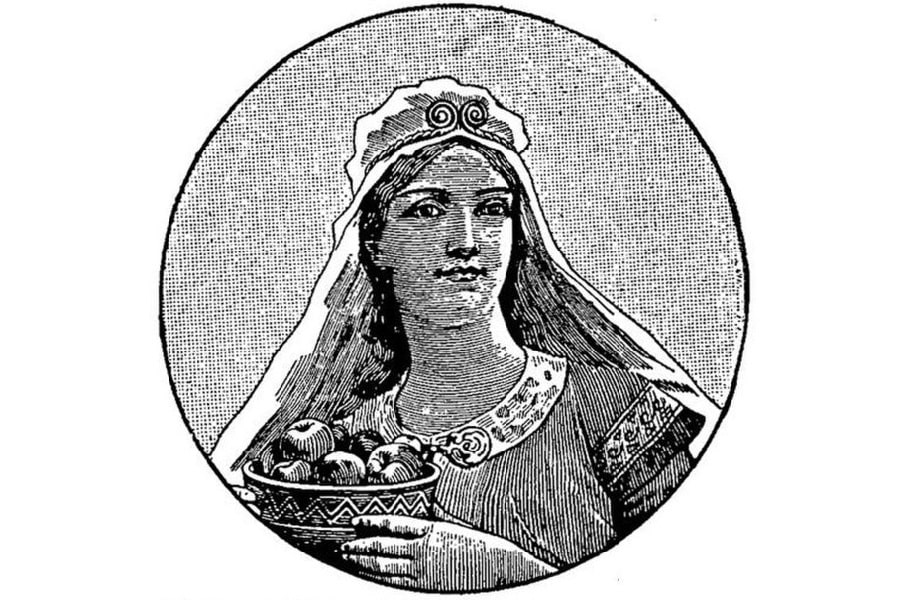
Idunn’s story is often referenced or told through the lenses of other figures in Norse mythology. Representing immortality, youth, rejuvenation, and often fertility, Iðunn was tasked with maintaining the source of the gods’ eternal youth and immortality: an enchanted stash of golden apples she carried on her person in a box called an eski.
Idunn is described as a beautiful woman with long golden hair. She’s most well-known for her apples, which some theorize to be a physical manifestation of her own beauty and youthfulness. In fact, theories surround Iðunn, as her lore is scattered across the mythology.
Idunn is married to Bragi, the God of Poetry and skalds, marking a link between the act of storytelling and immortality. She is most well known as the central plot point of the Haustlöng: when Loki, the Trickster God, lures Iðunn to the giant Thjazi in a bid to steal sacred apples.
What Does Idunn Mean?
Idunn’s name carries several meanings, all of which center around her powers of eternal youthfulness and immortality.
A simple translation of her name from the Old Norse means “The Rejuvenating One,” or “Giver of Eternal Youth,” further emphasizing her status as caretaker of the gods’ immortality. After all, Idunn was the only one capable of tending to and delivering her golden apples.
Iðunn is described in the Haustlöng as the one “maiden who understood the eternal life of the Aesir.”
How Do You Pronounce Idunn?
Idunn, which more accurately would be written as Iðunn, is pronounced: “IH-dune.” The letter Eth isn’t in modern English, and so her name is often anglicized as Idun, Idunn, Ithun, and sometimes even Iduna (to emphasize her femininity).
What Else Do We Know about Idunn?
Iðunn appears in the Prose Edda with the story of Haustlöng, as well as the Poetic Edda poem of Lokasenna.
In the Poetic Edda Bragi gets involved in a disagreement with Loki, which Idunn helps defuse. She is more prominent in the Haustlöng, which tells the story of Loki and his scheme to steal away her apples for the jötunn Þjazi.
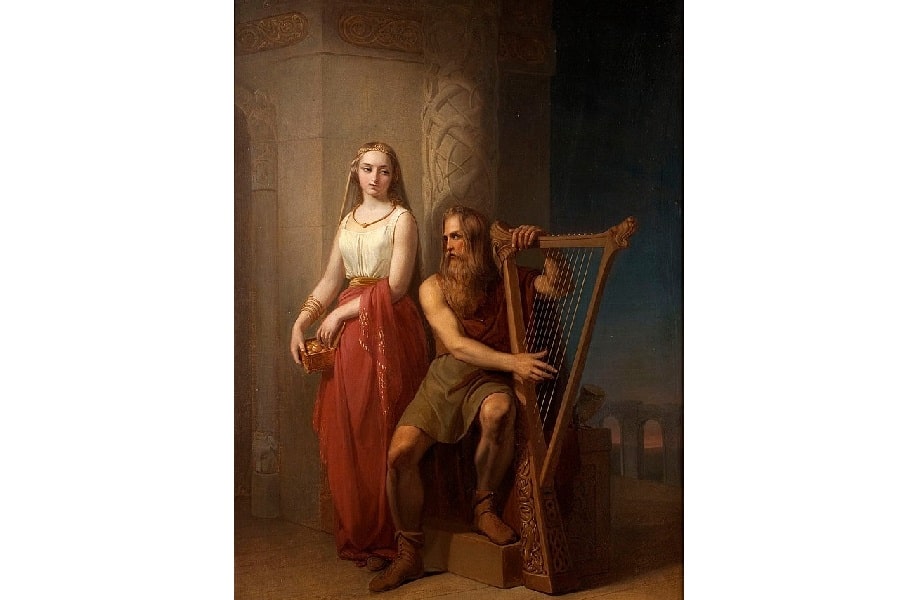
What is Idunn the Goddess Of?
Idunn is the goddess of immortality, rejuvenation, youth, and fertility. Because of her limited appearances in the mythology, not much else is known about her beyond her powers of bestowing immortality and eternal youth upon the gods.
Because of her eternal youth and rejuvenating properties, she is considered also to be the goddess of eternal spring. This also plays into her golden apples, the fruit she carries to imbue the gods with eternal youth and immortality.
What Was Idunn’s Power?
While some sources believe her golden apples were the source of this power, others contend that Idunn herself was imbued with these powers, and the apples were a manifestation of that.
While some suggest the text does mention apples in other stories, some contend that “Idunn apples” were some other fruit, and medieval Christian scholars wrote in apples for synergy with the story of Genesis.
Is Idunn a Part of the Aesir or Vanir?
The distinctions between the Aesir and Vanir are often ill-defined, and the differences between them are nebulous. The Aesir are described as valuing strength, power, and war, while the Vanir value nature, mysticism, and harmony.
While Iðunn’s powers might seem like a fit for the Vanir, she was considered to be Asynjur: a goddess of the Aesir. After all, she tended to them, so it would make sense she was a part of them too!
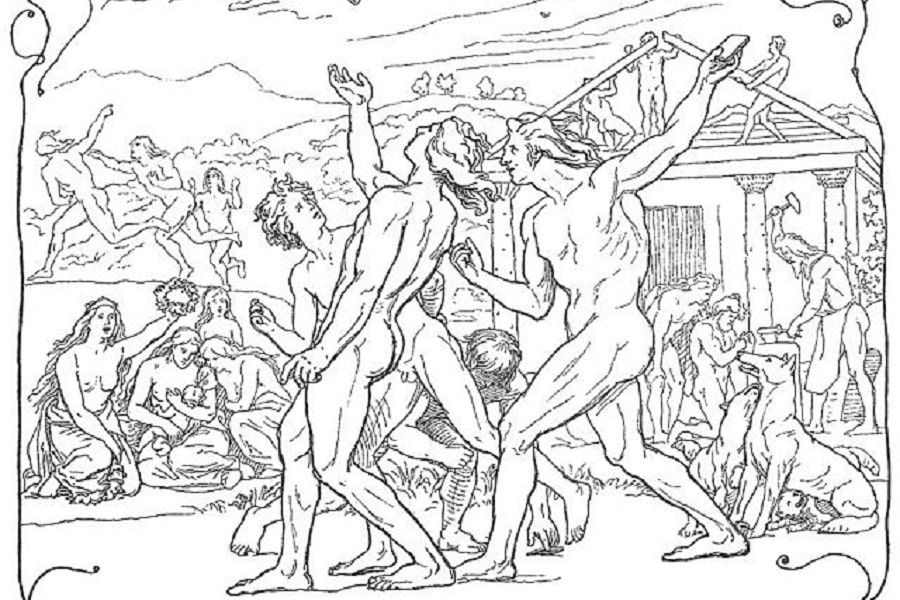
Who Was Idunn’s Husband?
As little is known about Idunn outside of the specific tales she’s featured in, we are unsure of her immediate family members, who are often unmentioned or referenced in passing.
However, Idunn’s most prominent family member would be her husband, Bragi, god of poetry and skalds. The marriage between the god of poetry and the goddess of immortality is no coincidence.
Poetry and legend were highly valued in Norse culture as a means of celebrating one’s deeds and life, and are often seen as their own form of immortality. Through the tales of Bragi, in fact, many of the gods and goddesses find immortality of their own.
Bragi was also the god of music and was described as having a beautiful singing voice and incredible talent with the harp. He was tasked with welcoming fallen warriors into Valhalla with his music and poetry. He is described as having a long beard with runes carved onto his tongue.
Bragi’s origins are also contested: some sources cite him as the son of Odin, while others suggest Odin was so impressed with his musical talent and poetry that he bestowed godhood upon him. He was considered a winter god of leisure, as his focus on entertainment went perfectly with the end of harvest and the onset of winter.
Who is Idunn’s Family?
Although Idunn’s family is lost to us, there is a relation in her powers to other Aaesir goddesses of Norse mythology. Similar to Frigg and Freyja, she is a fertility goddess, considered part of the power behind the scenes. It is believed that her powers may have been derived from those of Frigg and Freyja, and she evolved from the tales of those goddesses.
As part of Idunn’s story in the Lokasenna as part of the Poetic Edda, Loki accused Iðunn of sleeping with her brother’s killer, insulting her in the process. While this story remains, we have no further evidence of who Idunn’s brother would be, and why Bragi might be accused of killing him.
Because Idunn is only mentioned in passing or as part of a larger story, we really don’t know much about her outside of her powers and her naivety. Unfortunately, despite holding one of the greatest powers of the Norse gods and goddesses, most of what we know about her has been lost to time.
This is concurrent with other figures, like Sif, the goddess of harvest, whose powers, family, and importance are contested.
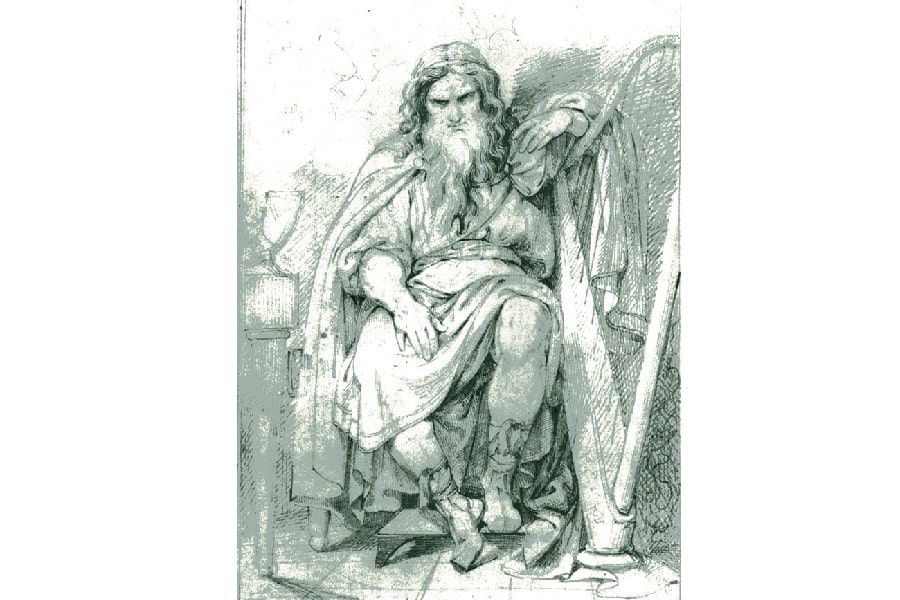
Poetic Edda: Idunn the Peacekeeper
One of Idunn’s appearances is in the Lokasenna, a section of the Poetic Edda focused on Loki. Within this poem, Loki and the other gods become embattled in a contest of flyting: an exchange of insults that is often committed in verse. The term flyting originates from the Old English term flītan, meaning “to quarrel,” and is often featured in Norse, as well as Celtic myth.
Lokasenna introduces Idunn as the wife of Bragi, and we then see her directly addressed by Loki when he accuses her, stating that she “placed your arms, washed bright, about your brother’s slayer.”
Despite this, Idunn implores Bragi to not engage with Loki, determined to keep the peace and not allow this flyting to get out of hand. The goddess Gefjon then suggests Loki was joking, and the poem continues.
Loki’s claims are contentious, but there is little lore to explore them further: there is no mention of Idunn’s brother from what we know about the mythology, and likewise no mention of Bragi’s alleged murder of him.
Modern scholars suggest Loki was simply leveling accusations at the gods that they had no chance of rebuking: suggestions that were so outlandish that even denying them gave them some credence. This does seem to be a great strategy for winning an argument, even in modern times!
From what we see of Idunn here, she seems like a reasonable and level-headed person, even if she is a bit naive in assuming no maliciousness behind Loki’s words.
Prose Edda: Loki and Idunn’s Abduction
Idunn’s most prominent feature in the mythology is the story of Haustlöng, a poem from the Prose Edda that tells the tale of Loki’s treachery of Idunn and her abduction by the jötunn Þjazi.
Jötnar (the plural of jötunn) were mythical creatures that lived amongst the gods and non-humans of the mythology. They are often likened to giants, although they could shift between shapes and weren’t necessarily large.
Þjazi, anglicized as Thiazzi, was one of these creatures who often took the shape of an eagle. After getting into a disagreement with Loki, a plot to lure Iðunn and her apples away took shape.
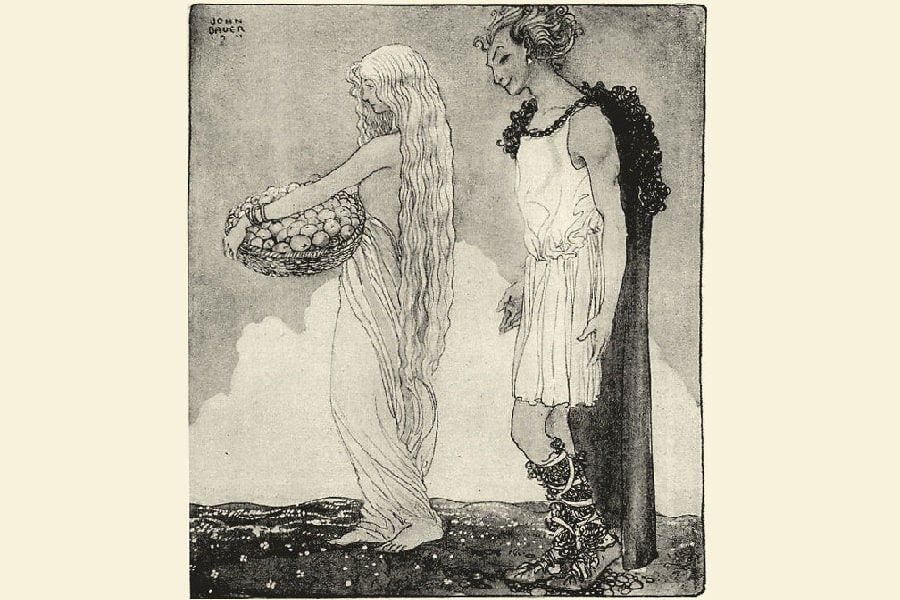
Thiazzi Snatches Idunn
It all went down when Loki, Odin, and Hœnir were traveling on a hunting trip. After slaying an ox, they prepared to feast, when they found the fire they had built was unable to cook the ox’s meat.
Þjazi, in the form of a large eagle, watched them try and fail to cook the meat, and suggested a bargain: if they gave him the first bites of the ox, he’d help them cook it.
The gods agreed, and Þjazi swooped down to feast upon the ox. Loki, growing irritated with how much food Þjazi was taking, rammed his staff into the eagle’s body.
Suddenly unable to let go of his staff, Þjazi flew up into the air with Loki and demanded that, in exchange for his life, Loki would help him steal Idunn and her golden apples away.
After his release, Loki lures Iðunn away, telling her he had seen a golden apple in the woods outside Asgard. As she arrived, Þjazi swooped down in eagle form to snatch her away and steal her sacred apples, taking her to his home in Jötunheim, the land of the jötnar.
With her disappearance, the gods of Asgard began to mysteriously grow older. Quickly taking notice of this change, they automatically assumed Loki had enacted some scheme, and had Loki arrested. With the plot revealed Loki promises to return Idunn, under threat of death.
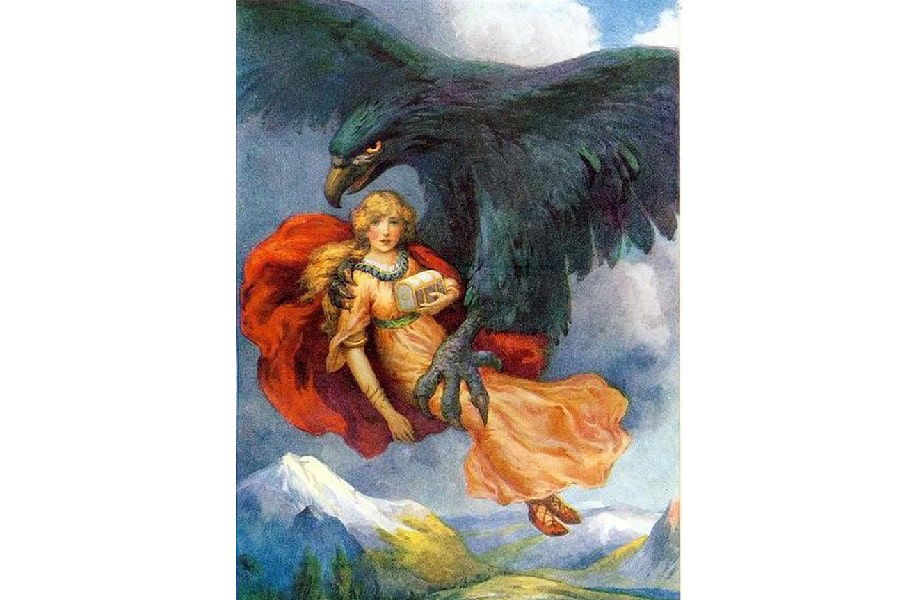
Apple Picking with Loki: AKA, Getting Idunn Back to Asgard
Loki borrowed a plumage from Freyja and transformed into a hawk, flying across the lands to Jötunheim. He found Idunn in Þjazi’s residence, alone, as it seemed he was out fishing. He was able to transform her into a nut, for easy carrying, and took her back to Asgard.
As a side note, the Prose Edda does not actually mention Þjazi stealing the apples themselves, nor Loki returning them. This is another interesting piece of evidence for the theory that Idunn’s apples were actually powerless, and it was Idunn herself who was bestowed with the powers of eternal youthfulness.
Loki raced back to Asgard, but it wouldn’t matter: Þjazi returned from his travels, and realized Idunn was missing. He flies to Asgard as well, but the gods had a plan in place.
With Þjazi on the horizon, the gods laid a trap. Immediately after Loki landed with Idunn, they set fire to a pile of wood shavings they had laid out in the eagle’s path. Þjazi was unable to adjust his course, and crashed headlong into the fire, falling to the ground. The gods were able to slay him, and Idunn was returned.
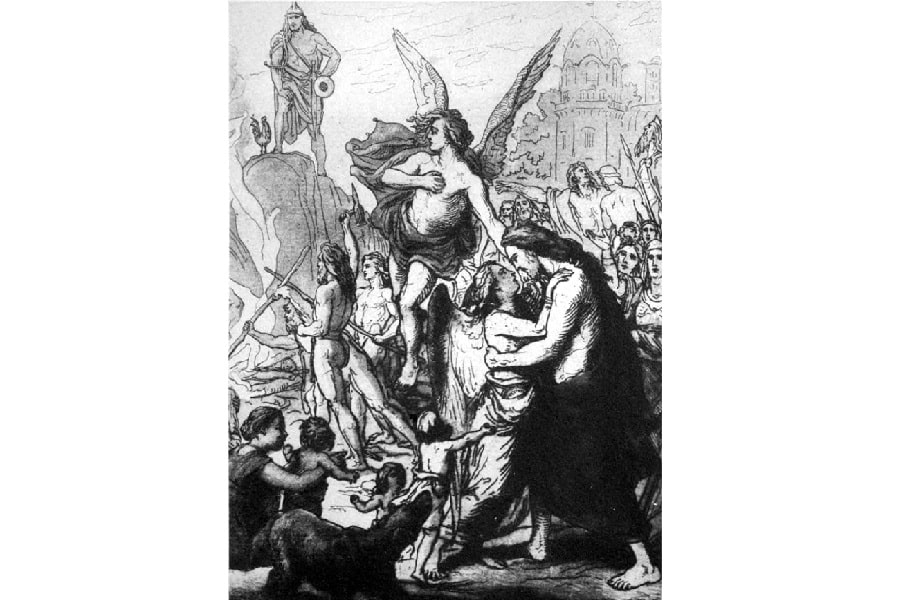
So, How ’bout Them Apples?
We’ve mentioned several times that there is some contention as to whether or not Idunn had any connection to apples.
It’s worth considering, for example, that other mythology and beliefs likely influenced the retelling of Norse myths. Apples are prominent sources of renewal and rejuvenation in Greek mythology, as well as Germanic and Anglo-Saxon myths. However, archaeological digs have found apples and symbols referencing them as well.
Apples also seem to have some relation to fertility in the mythology, further suggesting Idunn might have really been using apples. But other sources suggest that like other fertility goddesses, Idunn’s powers may have been a part of her, and the apples served as a manifestation of them.
Unfortunately, because of the relatively little we know about Idunn outside of her two appearances in the mythology, this will likely be a source of great speculation. But what is certain is how Idunn has impacted our understanding of Norse mythology.
Idunn in Popular Culture
Although lore does not focus heavily on Idunn, she remains highly relevant to popular culture, which mirrors her importance despite her limited appearances within it.
Idun was a popular Swedish magazine that focused on women. It often focused on literature, poetry, and discussions of gender identity. Fitting for its namesake: a powerful goddess with a clear love for poetry and literature!
Additionally, the Idunn Mons, a volcano on the planet Venus, was named after her. The various mountains on the planet have been named after goddesses from various mythologies.
Idunn in Video Games
One of the more prominent recent features of the goddess Idunn was in the 2018 God of War video game. Idunn Apples are a series of collectibles that offer the player a permanent health boost, mirroring the mythological apples of Idunn.
This is likely a play on how the apples don’t actually make the gods immortal, but rejuvenate them in some way, allowing them to remain eternally youthful and free of sickness.
Iðunn appears in the Assassin’s Creed video game series as well, as a member of the Isu race: a predecessor to humanity that was eventually deified by humans. Idunn retains her apples in this interpretation, which links them to the Apples of Eden: a prominent plot device in the series.
It’s interesting to consider this when thinking about how Iðunn’s apples may not have been apples after all, and how our history can be influenced by those writing it.

Idunn’s Immortal Impact
While she might not have been a prominent voice in mythology, Idunn and her apples played an undeniably important role in every tale.
Without her powers of rejuvenation, the Aesir gods would likely have grown old and sick, as they did during her brief abduction by Loki.
Her story mirrors that of many women in history: despite their critical work, their tales are often not as loudly told. Despite this, Idunn has had an outsized effect on us today, as we still remember (and often debate) her and her golden apples.